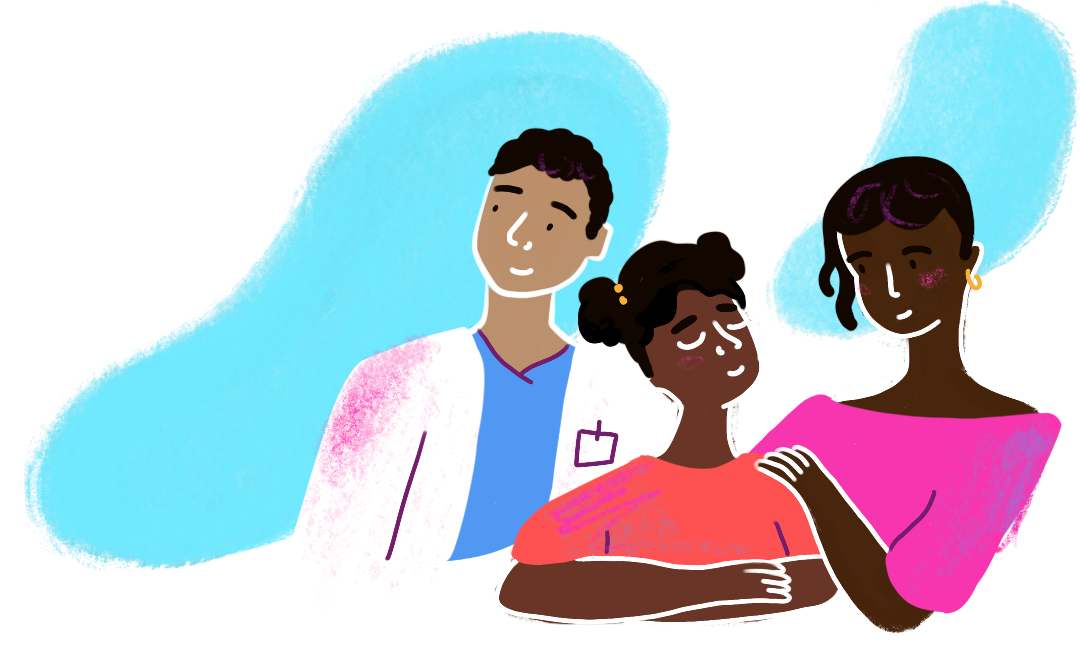How to use notes to help someone else with their health care
Open notes can be a tremendous resource for patients and their care partners.

Open Notes for Care Partners
Reading open notes can help people manage their health care and the care of others. This allows them to feel more confident, prepared, and in control.
After a medical visit, doctors, nurses, and other health care providers write notes that summarize important information about you. These notes become a part of your medical record. When a note is shared with you, it becomes an “open note.”
You can access your medical records using your health care system’s patient portal. Through the portal, you can request appointments, message your health care team, and view your open notes. If your doctor or nurse does not use a web portal, you can request a digital or paper copy of your notes.
Dealing with the health care system can be challenging. Family and friends play vital roles as caregivers or care partners who help “interpret” the experience of health care. They advocate for patients and assist them in managing their health care. Care partners organize medical appointments and tasks. They can improve communication between the patient and the care team. And they themselves can experience great stress.
Sharing notes through online patient portals helps patients and their care partners access their health information more easily. This leads patients to be more active in their own care. In a large survey of patients who read their notes, almost 40% said that they shared their notes with someone other than their hospital care team. Studies are examining why patients choose to share notes and how they and their care partners benefit from this shared access.
Patients of all ages choose to share access to their patient portals with a care partner. Their reasons for sharing include:
- 42% say they share access to their portal because their care partner helps them manage health care activities
- 30% say they share access with a care partner in case of emergency
- 18% say they share access because they themselves do not use a computer
Linda is a baby boomer. Right now, she’s able to manage her own health care, but as she ages, she expects that her children will become more involved. Because she wants them to be able to make informed decisions on her behalf, she shares her medical information with them using open notes on her hospital’s secure, patient portal.
Subtitles are available for this video in English and Spanish. To view subtitles, click the Settings icon , click Subtitles/CC , then choose your preferred language.
Studies show that the benefits of note sharing are as powerful for care partners as they are for patients. Access to open notes can help care partners:
Respond to a crisis. By having access to this health information, families and care partners can better support patients in managing their health, which can be especially helpful in emergencies.
Navigate the health system. Managing health care demands can be difficult, especially for patients with complex health needs. Providing access to notes can help ensure that everyone on the care team, including the care partner, is on the same page.
Advocate for patient safety. Sharing notes with care partners may help them understand the patient’s medical condition and be better prepared to join in managing care. Care partners can alert the health care team to errors in the patient’s health record or to missing information. These benefits may be more important when family members live at a distance and cannot be present during face-to-face encounters.
Navigate language or technical barriers. When care partners have access to notes, they can help to alleviate language barriers for patients who do not speak or are learning English. In addition, although there are many benefits from having easy access to information on patient portals, not everyone has a computer. And some patients with computers don’t know how to access and use their medical record. By providing computer access, technical support, or translating medical information, care partners can help patients be more active in their own care.
Merelyn plays a pivotal role in advocating for her sister’s health. She helps her sister manage medical tasks and communicates with health care providers.
Subtitles are available for this video in English and Spanish. To view subtitles, click the Settings icon , click Subtitles/CC , then choose your preferred language.
- 88% of patients, and 86% of care partners said they were able to prepare better questions for the doctor
- 86% of patients, and 82% of care partners reported they had more productive discussions about the patient’s care
- 85% of patients, and 79% of care partners stated they were more likely to agree about the patient’s treatment plan
- 94% of patients and their care partners said they had greater understanding of health conditions and that they better remembered the patient’s care plan and felt more in control
Ask for proxy (shared) access to the patient portal account. Some health systems allow patients to permit a care partner to have a secure log in of their own. This is often referred to as proxy, or “shared access” (not to be confused with healthcare proxies). This enables the care partner to access the patient’s health information. They can read the notes, schedule appointments, refill prescriptions, or communicate with the health care team.
“As consumer health information technology becomes more mainstream, the ability of doctors, nurses and others to differentiate the identity of who—the patient or an involved family member or friend—is exchanging secure email messages, refilling medications, and viewing patient health information will become increasingly important in the delivery of safe and clinically appropriate care.”
—Jennifer Wolff, PhD, Johns Hopkins Bloomberg School of Public Health


 OpenNotes is a global movement. We encourage and study open and transparent communication in health care. We work with patients, families, doctors, nurses, social workers, and other clinicians. We are part of the Beth Israel Deaconess Medical Center, which is a Harvard Medical School teaching hospital. Our work is not-for-profit, and we are supported by grants and donations. To support OpenNotes and to learn more, visit the
OpenNotes is a global movement. We encourage and study open and transparent communication in health care. We work with patients, families, doctors, nurses, social workers, and other clinicians. We are part of the Beth Israel Deaconess Medical Center, which is a Harvard Medical School teaching hospital. Our work is not-for-profit, and we are supported by grants and donations. To support OpenNotes and to learn more, visit the 

